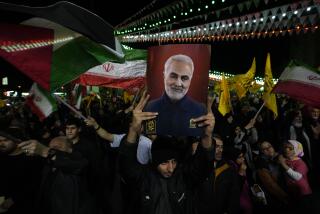Agency seeks private help in destroying Syrian chemical arms
The international agency tasked with locating and destroying Syria’s chemical weapons said Thursday it was calling for help from private industry in neutralizing 1,000 metric tons of chemicals and munitions after U.S. ally Albania balked at hosting the operation.
In a report on its “detailed plan of destruction” approved Thursday, the Organization for the Prohibition of Chemical Weapons laid out its prioritized destruction schedule under which the most dangerous chemical arms and substances -- already removed from the country -- will be rendered harmless and buried in secure waste sites.
“I am currently reaching out to others to consider joining this international effort,” Sigrid Kaag, coordinator for the joint U.N.-OPCW mission, told the agency’s executive council in the Hague.
She described the inclusion of private, outside expertise as “key to the successful implementation” of the agreement brokered by the United States and Russia for Syria’s poison gases and nerve agents to be removed from the civil-war-torn country and destroyed.
U.S. Secretary of State John F. Kerry and Russian Foreign Minister Sergei Lavrov devised the plan to rid Syrian President Bashar Assad of his chemical arsenal in September, after sarin gas was used in an Aug. 21 attack on rebel-held suburbs of Damascus. Assad accepted the disarmament plan under threat of U.S. airstrikes in punishment for the sarin attack said to have killed more than 1,000 Syrians, mostly civilians.
The OPCW planned to post a formal appeal later Thursday for “expressions of interest” from companies able to treat and dispose of the chemicals, the Associated Press reported, citing an unnamed agency source.
The agency, which was awarded the Nobel Peace Prize this year for its work to eliminate weapons of mass destruction, suggested in its news release on the mission plan that it was on target to complete the “sequenced destruction” by March 15, 2014. Syria should be free of all declared chemical materials by the end of June, the agency added.
Work to dismantle the most hazardous weapons and compounds may be carried out at sea, on either specially outfitted barges or idle oil-drilling platforms, and the neutralized waste brought back ashore for disposal, agency officials have said.
The OPCW call for outside help follows by a week Albania’s decision against allowing U.S. technical experts to dismantle, destroy and dispose of Syria’s chemical weapons in the tiny Balkan nation.
Albania sustained widespread environmental damage during the tyrannical postwar rule of dictator Enver Hoxha, when a hellbent drive for industrialization expanded mining, energy and chemical production with little heed for the health consequences of unregulated development.
Although Albania has been a loyal ally of Washington since breaking from its hard-line-communist chains two decades ago, hosting the Syrian weapons dismantling became a political hazard for Prime Minister Edi Rama. The embattled government leader last week pronounced on national television that it was “impossible for Albania to take part in this operation.”
ALSO:
Iran appears to stiffen demands at nuclear talks
Karzai says he might leave it to successor to sign U.S. accord
Poland, while hosting U.N. climate confab, sacks environment chief
Twitter: @cjwilliamslat
More to Read
Start your day right
Sign up for Essential California for news, features and recommendations from the L.A. Times and beyond in your inbox six days a week.
You may occasionally receive promotional content from the Los Angeles Times.







